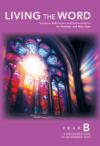Scripture Study for
Thirty-Third Sunday in Ordinary Time
Malachi 3:19–20a / Psalm 98:9 / 2 Thessalonians 3:7–12 / Luke 21:5–19
<< Back to LECTIONARY RESOURCES
Understanding the Word
By Br. John R. Barker, OFM
The first several decades of the post-exilic period were a time of great trial. The former kingdom of Judah remained under foreign rule and only very slowly emerged from severe economic and demographic stagnation. Malachi focuses on additional problems: the resumption of injustice in the land, widespread marital infidelity, and priestly negligence and complacency. Through the prophet, God continually chastises the people for persisting in many of the very behaviors that led to the Exile in the first place. Where was the purification that was supposed to have taken place? The people always respond to these criticisms with disbelief: “How have we disdained your name?” (1:6). The prophet and others begin to wonder, “Where is the just God?” (2:17). In response we have today’s short reading. There will come a purifying fire when the Lord comes in judgment. The heat of God’s judgment will consume evildoers, but it will bring “healing rays” for those who are faithful to God.
In his conclusion to his Second Letter to the Thessalonians, Paul exhorts the community to avoid acting in a “disorderly” way, which is to say, in a way that disrupts the peace and harmony of the community. This can happen in a couple of ways: by sowing doubt and dissension about Christian doctrine or by refusing to contribute to the needs of the community through work (3:6). As they have been instructed to look to Christ as a model of trust in God (3:5), so they should look to Paul as a model of industriousness for the “common good.” Paul and his companions have avoided burdening the Thessalonians by demanding anything from them, but instead have worked for their bread. Those among them who are shunning work (perhaps because they thought the parousia had already occurred) or otherwise disrupting the harmony of the community are not looking out for the good of that community.
The temple in Jerusalem was massive and completely covered in gold. It must have been hard to imagine that it could ever be destroyed, as Jesus claims it will be (and was, by the Romans, in A.D. 70). Jesus assures the crowd that there will come a time when the world will come undone. But before this, and more immediately relevant to them, his followers will be subjected to the same trials and persecution that he is about to undergo. In response to this, they should not fear, but trust in God and see the trials as occasions to proclaim the gospel, which is perhaps most effectively and authentically preached under such circumstances. Although many will suffer, some even to the point of death, yet “not a hair on your head will be destroyed” if they remain faithful. He is speaking, of course, of life in him, both in this world and in the next.
